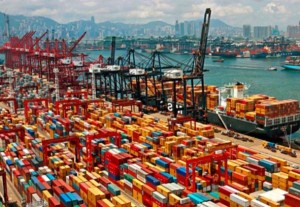 The slumping economy in China hit trade hard during January, as both exports and imports were worse than had been anticipated. The monthly trade surplus increased to $60 billion, which set a new record.
The slumping economy in China hit trade hard during January, as both exports and imports were worse than had been anticipated. The monthly trade surplus increased to $60 billion, which set a new record.
Exports from China dropped 3.3% during January from the same time one year ago, while the country’s imports fell 19.9% according to data that was released by the Customs Administration.
Analysts were expecting exports to increase by 6.2% and imports to drop just 3% of an overall trade deficit of just $48.8 billion.
The crude oil and iron imports into China were down by 0.6% and 9.4% respectively by volume.
In value terms however, imports of iron ore fell 50.3% and imports of crude oil were off by 42%. This data reflects the cooling of the economic growth in China, as last year China’s gross domestic product expanded at the slowest rate in over two decades.
A survey that was published Sunday showed that manufacturing which is a key sector in the economy in China shrank during January for just the first time in over two years.
Analysts however, said seasonal distortions that were strong because of the date the Lunar New Year holiday was celebrated where consumption spikes and production drops, make it tough to interpret the trade numbers for January.
Last year’s holiday was in January, but this year it was during February.
The expanding trade surplus normally would be expected to support the appreciation of renminbi but the currency weakened by 0.7% during January, reflecting outflows related to investment.
China suffered the largest outflows of capital on record during the 2014 fourth quarter, according to data released last week. The deficit of over $91 billion on financial and capital accounts was the worst quarter data since it was first reported back in 1998.
Policy makers responded to this weakness in the Chinese economy by lowering interest rates and the reserve ratio was lowered for banks as efforts were stepped up to counter capital outflows and encourage more lending by banks.
